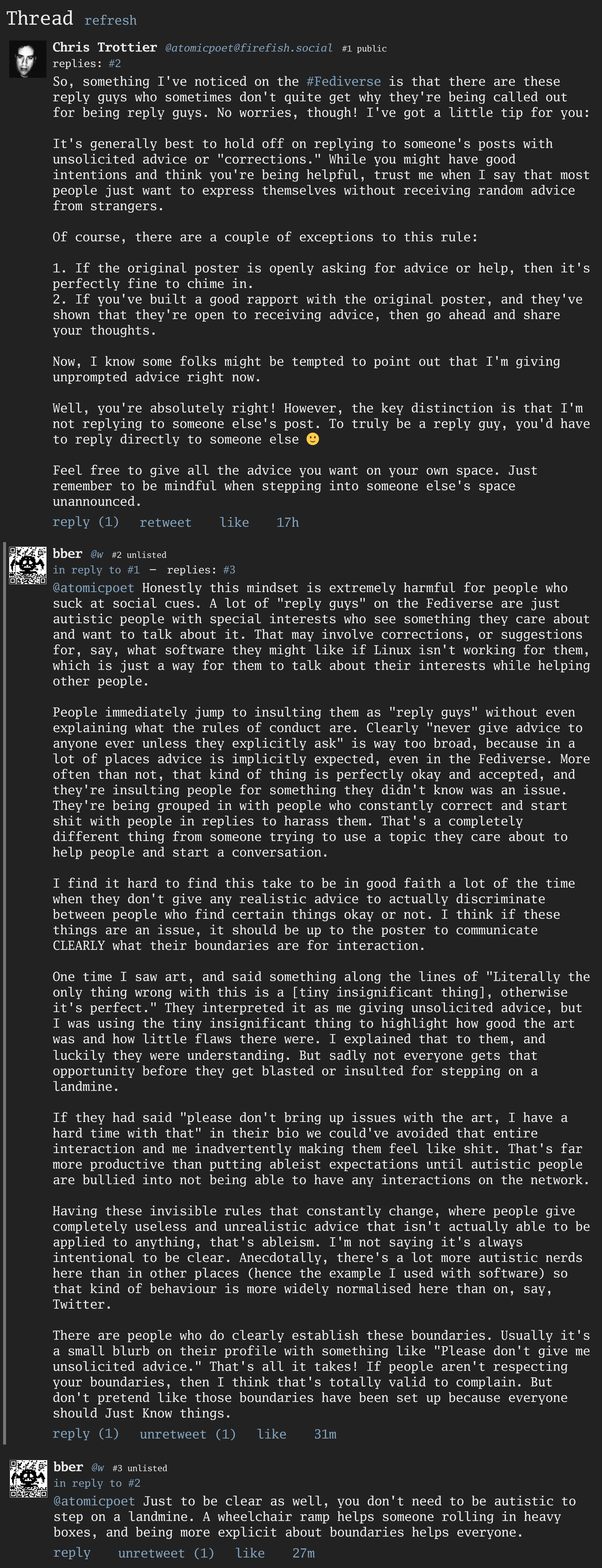So, something I've noticed on the #Fediverse is that there are these reply guys who sometimes don't quite get why they're being called out for being reply guys. No worries, though! I've got a little tip for you:
It's generally best to hold off on replying to someone's posts with unsolicited advice or "corrections." While you might have good intentions and think you're being helpful, trust me when I say that most people just want to express themselves without receiving random advice from strangers.
Of course, there are a couple of exceptions to this rule:
- If the original poster is openly asking for advice or help, then it's perfectly fine to chime in.
- If you've built a good rapport with the original poster, and they've shown that they're open to receiving advice, then go ahead and share your thoughts.
Now, I know some folks might be tempted to point out that I'm giving unprompted advice right now.
Well, you're absolutely right! However, the key distinction is that I'm not replying to someone else's post. To truly be a reply guy, you'd have to reply directly to someone else 🙂
Feel free to give all the advice you want on your own space. Just remember to be mindful when stepping into someone else's space unannounced.
Honestly this mindset is extremely harmful for people who suck at social cues. A lot of "reply guys" on the Fediverse are just autistic people with special interests who see something they care about and want to talk about it. That may involve corrections, or suggestions for, say, what software they might like if Linux isn't working for them, which is just a way for them to talk about their interests while helping other people.
People immediately jump to insulting them as "reply guys" without even explaining what the rules of conduct are. Clearly "never give advice to anyone ever unless they explicitly ask" is way too broad, because in a lot of places advice is implicitly expected, even in the Fediverse. More often than not, that kind of thing is perfectly okay and accepted, and they're insulting people for something they didn't know was an issue. They're being grouped in with people who constantly correct and start shit with people in replies to harass them. That's a completely different thing from someone trying to use a topic they care about to help people and start a conversation.
I find it hard to find this take to be in good faith a lot of the time when they don't give any realistic advice to actually discriminate between people who find certain things okay or not. I think if these things are an issue, it should be up to the poster to communicate CLEARLY what their boundaries are for interaction.
One time I saw art, and said something along the lines of "Literally the only thing wrong with this is a [tiny insignificant thing], otherwise it's perfect." They interpreted it as me giving unsolicited advice, but I was using the tiny insignificant thing to highlight how good the art was and how little flaws there were. I explained that to them, and luckily they were understanding. But sadly not everyone gets that opportunity before they get blasted or insulted for stepping on a landmine.
If they had said "please don't bring up issues with the art, I have a hard time with that" in their bio we could've avoided that entire interaction and me inadvertently making them feel like shit. That's far more productive than putting ableist expectations until autistic people are bullied into not being able to have any interactions on the network.
Having these invisible rules that constantly change, where people give completely useless and unrealistic advice that isn't actually able to be applied to anything, that's ableism. I'm not saying it's always intentional to be clear. Anecdotally, there's a lot more autistic nerds here than in other places (hence the example I used with software) so that kind of behaviour is more widely normalised here than on, say, Twitter.
There are people who do clearly establish these boundaries. Usually it's a small blurb on their profile with something like "Please don't give me unsolicited advice." That's all it takes! If people aren't respecting your boundaries, then I think that's totally valid to complain. But don't pretend like those boundaries have been set up because everyone should Just Know things.

That kind of sounds like a person actually asking for empirical evidence and relevant studies though
Ah yes, Popper's paradox of tolerance strikes again. (If demonstrating intolerance is the appropriate reaction to witnessing intolerance, how can you distinguish between first order and second order intolerance in the behaviour of others?)
How does tolerance or intolerance interact with the questions regarding sources to claims?